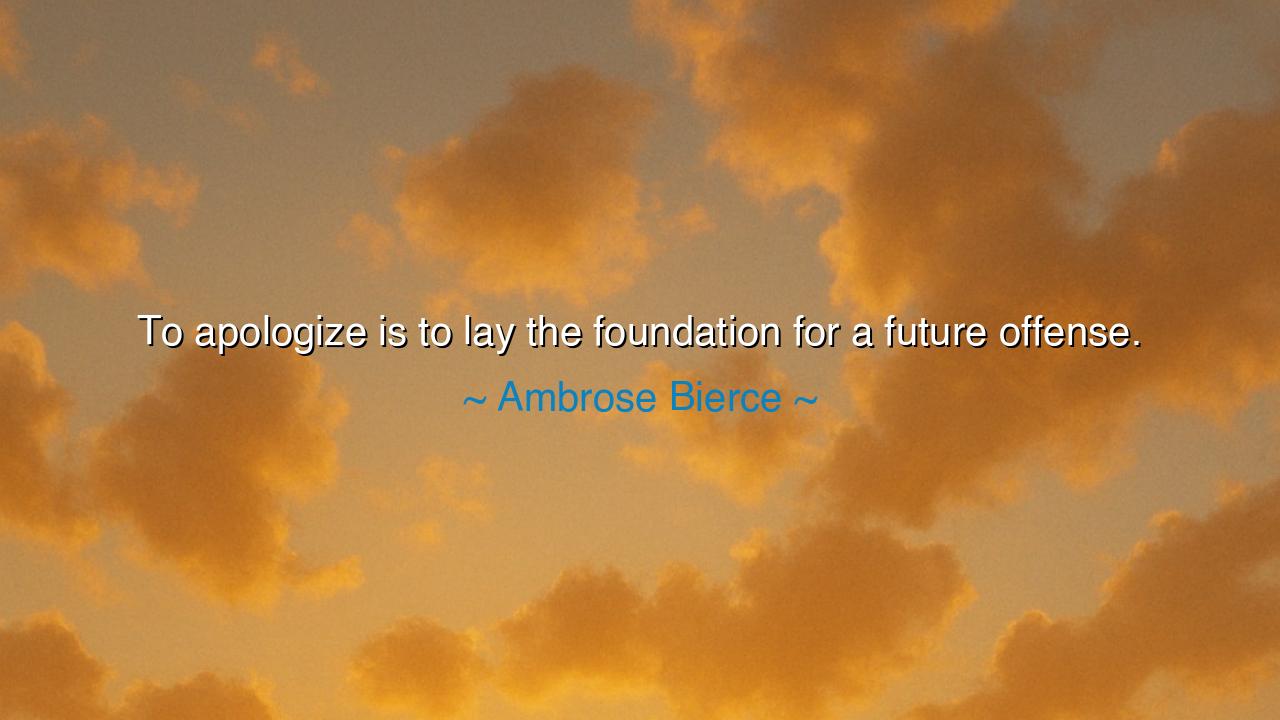
To apologize is to lay the foundation for a future offense.






“To apologize is to lay the foundation for a future offense.”
— Ambrose Bierce
In this sharp and haunting declaration, Ambrose Bierce, the dark satirist of the American century, unveils a truth that stings with cynicism but glimmers with insight. His words are not the language of comfort, but of warning. When he says, “To apologize is to lay the foundation for a future offense,” he speaks not merely of manners or misdeeds, but of the nature of human weakness—the endless cycle of guilt, regret, and repetition that has followed mankind since the dawn of time. For Bierce, an apology is not the end of an error, but the seed of its return; not the healing of the wound, but the soft bandage that allows it to fester beneath.
The origin of this quote lies in Bierce’s lifelong observation of human hypocrisy. A soldier of the Civil War, a journalist of ruthless wit, and a man disillusioned by politics and piety alike, he saw how easily words replaced deeds, and how often contrition served as a substitute for change. In his Devil’s Dictionary, where satire became scripture, he turned moral sayings upside down to reveal the shadows within them. To him, the apology was a ritual of comfort rather than repentance—a polite confession that freed the offender’s conscience but left the roots of wrongdoing untouched. Through these biting words, he teaches that true virtue does not dwell in apology, but in transformation.
To apologize, in Bierce’s vision, is to acknowledge fault without extinguishing it. How many, after uttering “I’m sorry,” feel absolved, only to repeat the same injury again? The apology becomes the foundation of habit, the rehearsal for the next offense. When contrition becomes easy, action becomes hollow. This, Bierce warns, is the danger of the human heart—it seeks forgiveness more eagerly than correction. He understood what sages and prophets before him had whispered: that remorse without reform is the twin of deceit. It is the illusion of morality, cloaked in sincerity yet hollow in effect.
History, too, bears witness to this pattern. Consider the tale of King Henry VIII of England, who sought forgiveness from God and the Church after each transgression, only to plunge deeper into tyranny with every pardon. Each apology to heaven laid the groundwork for his next act of defiance—the discarded wife, the broken oath, the severed head. He mastered remorse as a political art, using it to cleanse his conscience while continuing his descent. Thus Bierce’s words ring true through the corridors of power: when repentance is spoken but not lived, it becomes the mask of corruption. The future offense is born the moment forgiveness is granted to one who refuses to change.
And yet, beneath Bierce’s cynicism lies a deeper wisdom, one that calls for authenticity and responsibility. His words are not a condemnation of apology itself, but a demand that apology be sacred—not casual. To apologize truly is not to prepare for another sin, but to sever its lineage. It requires humility, but also resolve—the courage to alter behavior, not merely soothe guilt. For the apology that is honest becomes a cornerstone of integrity, while the apology that is hollow becomes the architect of betrayal. Bierce’s warning, though bitter, is also medicinal: it urges us to make our words as rare and weighty as our actions.
There is an ancient proverb that echoes this truth: “The repentant tongue is noble only when followed by the obedient hand.” The Greeks spoke of metanoia—the turning of the soul—not merely the utterance of regret, but a transformation of being. So too must we, when we err, ensure that our repentance builds not a foundation for future offense, but a bridge to virtue. The act of apology must not become a ritual of self-excuse; it must be a vow, a sacred covenant that what was done once will not be done again. To apologize is easy—to change is divine.
So, my listener, take this wisdom as both mirror and challenge. When next you are tempted to apologize, ask yourself: Is this an ending, or merely an intermission before my next fault? Let your apology be rare, but powerful—spoken only when accompanied by genuine transformation. Do not seek the comfort of forgiveness unless you are ready to bear the weight of responsibility. For as Ambrose Bierce teaches, every false apology becomes the architect of future wrongdoing, and every true one, the cornerstone of redemption.
Therefore, guard your words and shape your actions, that they may be one and the same. Let your contrition be not the foundation of offense, but the seed of renewal. Only then does the apology cease to be a hollow promise and become what it was always meant to be: a turning of the soul toward light, a rebirth of honor, and the beginning of a better self.






AAdministratorAdministrator
Welcome, honored guests. Please leave a comment, we will respond soon